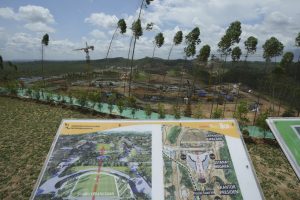Indonesia has announced a range of new incentives for international firms to invest in its new capital, in a bid to speed up the sluggish progress of the city’s construction. Nusantara, as it is known, is currently being carved out of the red earth of East Kalimantan province on the island of Borneo, at the exact geographic heart of the Indonesian archipelago.
According to a new policy announced on March 6, the government will provide up to 100 percent corporate tax holiday for companies investing at least 10 billion rupiah ($650,745) in the new capital, as Bloomberg reported yesterday. These tax holidays will last between 10 and 30 years, depending on the sector, and will be in place the longest – until 2035 – for those firms involved in setting up Nusantara’s infrastructure and public services.
As Reuters reported, “Tax cuts will also be given to foreign companies moving their headquarters to Nusantara and financial firms setting up in its financial zone. Research and development costs will be tax deductible, while import taxes on capital goods will be removed, among other incentives.”
Indonesia began construction of the new capital in mid-2022, and the project stands as a monument to the legacy of President Joko Widodo, whose tenure has focused heavily on domestic economic development. The new capital is slated to replace Jakarta, a megalopolis of 10.5 million that is congested, plagued by air pollution, and gradually falling into the Java Sea. The Indonesian government says that Nusantara will be built on sustainable principles and will be largely powered by renewable energy, though environmentalists claim that the city’s construction in the wilds of East Kalimantan will speed up deforestation in one of Asia’s few remaining swathes of pristine tropical rainforest.
During a media tour of the construction site in Kalimantan this week, Bambang Susantono told reporters that Indonesia will officially declare the city its new capital in the first half of 2024. Indeed, the government has previously declared its intention to have the capital ready by August 17 of next year – Indonesia’s Independence Day. The city’s infrastructure is now reportedly 14 percent complete.
Given that the state is only stumping up a fifth of the estimated $34 billion cost for the construction of the capital, its ability to “sell” the project to foreign investors will be crucial to its success. The incentives were first aired by the government in October, when Bambang Susantono, the chairman of the Nusantara National Capital Authority, said the $34 billion project offered a “lifetime opportunity” for investors.
Yet the project is in a state of uncertainty, with elections next February set to end the tenure of Jokowi, who has been closely associated with the project. With Jokowi barred from seeking a third term, some, including potential investors, have raised questions as to whether his successor will back the multibillion-dollar project. As Reuters reported, a survey of 170 experts conducted last June by the Centre for Strategic and International Studies in Jakarta found nearly 59 percent were unsure the new capital city would ever be built, citing uncertainty over funding and management.
Bambang this week waved these concerns aside, stating that the project would proceed as planned no matter who is elected next February – and indeed, the government may now have proceeded too far with Nusantara to abandon it. As such, there is a high likelihood that the project gets built, but the fact that the government is needing to introduce such strong incentives to attract investors suggests that the project’s progress will be long and potentially halting.

































